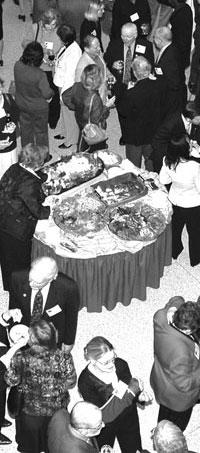A little more than 25 years ago, Boston State College (BSC) merged with UMass Boston. For many, the change brought new possibilities, but for the numerous faculty and students who still proudly acknowledged BSC as their Alma Mater, it was a death sentence.
The foundation for BSC began over 150 years ago in 1852 as the Girls High School. In 1960, after at least five name changes and reorganizations, Boston State College emerged as an affordable state school that offered an excellent education. Nevertheless, after the institution of UMass Boston in 1964, a number of questions regarding available funding and necessity for state schools in Boston appeared. These did not become pressing issues until 1980, when there was an increase in voter resentment regarding taxes in the middle of a dwindling economy.
Many believed that unifying Boston’s two state schools would not only be an economic solution, but one that would benefit the students as well. UMass Boston started out as a fairly small school offering programs in the arts and sciences as well as public and community service and management. The merger would bring combined curriculum that would present students with far greater choices including courses in education, nursing, criminal justice and physical education. This was favorable for incoming students and those already attending UMass Boston, but the current students and teachers of BSC felt as if they were being pushed out of the way, or rather squeezed into somewhere they did not belong.
Many BSC students transferred to UMass Boston, but hundreds more went elsewhere or just dropped out altogether. Only half of BSC faculty was permitted to relocate to UMass Boston while the others scattered to state schools or community colleges throughout Massachusetts. Those that had no luck finding new teaching jobs were left with few choices, and most were forced to resign.
Jack Looney, a professor in the environmental studies department, had been part of BSC’s faculty for almost 15 years when the merger took place. He recognized both advantages as well as pitfalls of the drastic change.
“UMass became stronger,” Looney stated, noting the expansion of new programs opportunities available to students. “But dislocation is painful,” he further explained, referring to student and faculty spirit and identification that was lost with BSC’s termination. “It had a very homey community,” in sharp contrast to UMass Boston today, which seems to lack that valuable component.
Vice Chancellor Darrell Byers only came to UMass Boston a year and a half ago, but the issue of the merger was quickly brought to his attention. He immediately felt a need to commemorate BSC. He formed the BSC Steering Committee, comprised of BSC staff, faculty and alumni. The committee planned a total of three events in order to honor the memory of BSC for those who attended, graduated, and taught there. The first event took place on Nov. 2, 2006 at the UMass club. More than 200 people showed up to partake in one of the first reunions in 25 years.
On Jan. 24, the twenty-fifth anniversary of the merger, Chancellor Michael F. Collins and the BSC Steering Committee invited BSC alumni, faculty and staff to the Harbor Point Campus Center for a night of honoring all those associated with BSC.
“Many came in BSC memorabilia,” Byers described of the night. “Many even came from out of town.” The occasion was planned to last until 8:30 p.m., but guests were so delighted to be in the company of old friends and teachers that the get-together ran over by two hours with ease.
During the night, Collins gave a very humble and inviting speech to all those attending the gala. He acknowledged the event as tailor-made to “celebrate the living memories and timeless values of Boston State College…we want to honor the legacy handed down to us by Boston State.”
A third event is tentatively planned for June where an entire room in the Campus Center will be dedicated in recognition of all those who attended or worked at BSC. The room is meant to honor and celebrate BSC, as well as to help alumni feel more comfortable and at home at UMass Boston.
BSC was an innovative school that produced a number of the nations widely recognized figures, as well as countless everyday citizens, both better off for attending BSC. The school will never be forgotten by those who went there, whether to study or teach, and thanks to the effort of many UMass Boston staff and faculty, the school will forever be honored and remembered. To quote Chancellor Collins, “As a university, we are mindful of the past while also focused on the future.”





















































